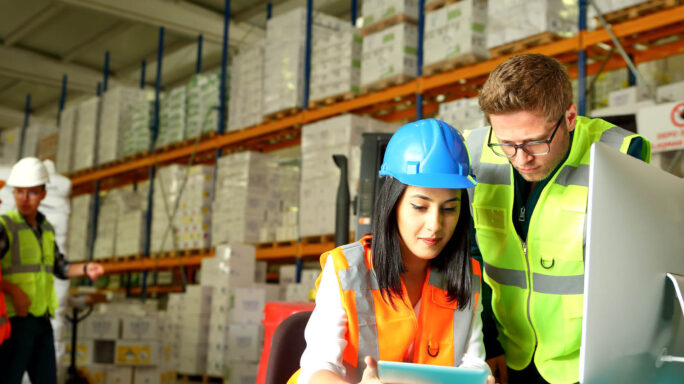Strategy, Legal & Operations
Customs and VAT after Brexit: What happens for Irish businesses?
This article outlines what Republic of Ireland businesses need to do about customs and VAT after the Brexit transition period ends.

Following the UK’s withdrawal from the European Union (Brexit) on 31 January 2020, the UK will soon be a ‘third country’ for the purposes of trade with the Republic of Ireland.
Under the Brexit agreement, a transition phase operates until 31 December 2020, which means that from 1 January 2021, the UK will no longer be part of the EU’s Single Market and Customs Union.
This has implications around customs and VAT for businesses operating in the Republic of Ireland that import from or export goods to the UK.
So what does the end of the transition period mean for your company?
This article will give small and medium-sized businesses advice on what they need to do about customs and VAT before 1 January 2021 to avoid lengthy delays in their supply chain and ensure the smooth running of their business.
We cover the following topics:
What it means for your business if you import from or export to Northern Ireland
What you need to know about customs and VAT if you trade with Great Britain from 1 January 2021
What you need to do now for doing business after 1 January 2021
Consider if you need a customs clearance agent
Find out your tariff classification
Will you need to pay customs duties on arrival?
Additional rules for food or agricultural products
What it means for your business if you import from or export to Northern Ireland
Special rules apply to Northern Ireland, which means there won’t be significant changes to the current situation that allows free movement of goods between Northern Ireland and the Republic of Ireland.
Aveen McShane, a senior manager with PKF-FPM Accountants, explains that “under the Northern Ireland Protocol, trade in goods across the island of Ireland, North and South, will continue unaffected with no change at the border, no new paperwork, and no tariffs or regulatory checks”.
What you need to know about customs and VAT if you trade with Great Britain from 1 January 2021
From 1 January 2021, any Irish businesses involved in importing goods from or exporting goods to Great Britain (England, Wales and Scotland) are obliged to submit customs declarations.
Aveen McShane says businesses need to determine who is responsible for their customs formalities and ensure they have all the information they will need to complete customs declarations.
Currently, when an Irish company imports a product from the UK, there is no UK VAT liability. The Irish company records an Irish VAT charge on their accounts and a corresponding credit using a reverse charge mechanism in their next VAT return.
From 1 January 2021, an Irish importing company will have to pay VAT at 23% at the point of import, which may potentially cause cash flow problems.
What you need to do now for doing business after 1 January 2021
There are a number of actions that you will need to take ahead of doing business in a post-Brexit world.
They include getting an EORI number, working out whether you need to start using an customs clearance agent, talking to your suppliers and finding out your tariff classification.
We cover these topics and more below.
Get an EORI number
You will need an Economic Operators Registration and Identification (EORI) number to continue to trade with the UK from 1 January 2021.
Applying for an EORI is a straightforward process. Simply submit a request by logging on to your Revenue Online Service (ROS) account and registering for customs and excise. The process takes a few minutes, and you should have your EORI within 24 hours.
If you are already registered for VAT, your EORI will be linked to your VAT number.
Once you have your EORI, Revenue will assign you a Trader Account Number, which allows you to make secure payments such as import duties through ROS.
If you wish your customs clearance agent to submit payments on your behalf, you will need to complete and submit a Customs and Excise clearance agent form.
Consider if you need a customs clearance agent
If you don’t have someone in your company with the expertise to complete the paperwork, you will need to engage a customs clearance agent.
While larger companies may have someone in-house who can handle customs paperwork, small and medium-sized businesses will need to find and engage a customs clearance agent to do this on their behalf.
Aveen McShane recommends that you look for an experienced agent with “Authorised Economic Operator (AEO) status as this is usually a good indicator of competency”.
Talk to your suppliers
Get in touch with your suppliers and customers to clarify your terms of trade and confirm who is acting as the importer or exporter of record.
If you import goods from Great Britain and goods are delivered with duty paid, your supplier may agree to continue with this arrangement.
However, there may be additional costs.
Make sure that you are clear on what you need to do to keep the process running smoothly.
If your supplier wants to change your arrangement, you will need to establish who will handle the export and import declarations and if customs duties increase who will absorb the costs.
If you are selling into the UK on a delivered basis, you should check your VAT position as you may need to register for VAT in the UK.
This process can take up to two months so if you haven’t done this already, don’t delay: get this process in motion as soon as possible.
Find out your tariff classification
When you buy goods from a supplier based in Great Britain and are responsible for importing these goods into Ireland, you will need to identify the classification codes for the products.
Then you’ll need to check they correspond with the supplier’s coding to ensure the codes are correctly entered on the customs declaration form.
These must be correct whether or not you are paying customs duties.
Depending on whether you are importing or exporting, you will find your classifications on the EU classification database, TARIC, or the UK database.
Will you need to pay customs duties on arrival?
It’s looking unlikely that a free trade agreement will be reached before 31 December 2020, so there will most certainly be customs duties to pay if you’re trading with companies in Great Britain.
You need to decide if you want to pay it for every shipment or set up a deferred payment arrangement with Revenue to pay customs duties and VAT.
If you decide on the latter, you must make an application to Revenue for the deferred arrangement – for this, you will require a bank guarantee.
If you’re not VAT-registered, customs and VAT will be payable at the point of import.
Microbusinesses that import very small volumes of goods may qualify for the small consignment relief if the value of the goods is under €150.
However, certain goods do not qualify for this relief: these include tobacco products, alcohol products and perfumes.
Additional rules for food or agricultural products
If your business operates in the food sector or involves other agricultural products, you will have additional obligations.
Firstly, you must register with the Department of Agriculture, Food and the Marine.
Your goods may be subject to additional regulatory conditions including sanitary and phytosanitary (SPS) controls if they are live animals, plants and products of animal and plant origin, says Aveen McShane.
You will need to understand the TRACES system, which records the origins of food products, and if you are importing food products from Great Britain, you will need to have certificates in place for your products.
Visit the Bord Bia website for more information.
Final thoughts on customs and VAT
If you haven’t started making provisions yet to get your business ready, you should start now.
Get in touch with your supplier, register for your EORI number, and determine what you need to do to be compliant with customs and VAT requirement to avoid lengthy disruptions in your supply chain.
It’s reasonable to expect delays when the Brexit transition period ends, so it makes sense to have a sufficient level of stock to last you through the first month or two.
If you feel overwhelmed by the volume of information, there are lots of resources out there to assist you.
Get in touch with your Local Enterprise Office to sign up for a Brexit customs workshop.
Aveen McShane advises businesses to review the Department of Enterprise Trade and Employment’s Brexit Readiness Checklist, which highlights the actions to take to get ready for Brexit.
Enterprise Ireland also offers a customs insights online course and a Ready for Customs Grant of up to €9,000 to assist businesses with managing the customs process after 1 January 2021. Further information can be found on the dedicated Prepare for Brexit website.







How do you record a duty only invoice when goods coming from UK to Ireland in Sage